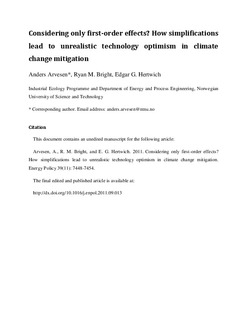Considering only first-order effects? How simplifications lead to unrealistic technology optimism in climate change mitigation
Journal article, Peer reviewed

Permanent lenke
http://hdl.handle.net/11250/297973Utgivelsesdato
2011Metadata
Vis full innførselSamlinger
Sammendrag
This article challenges the notion that energy efficiency and ‘clean’ energy technologies can deliver sufficient degrees of climate change mitigation. By six arguments not widely recognized in the climate policy arena, we argue that unrealistic technology optimism exists in current climate change mitigation assessments, and, consequently, world energy and climate policy. The overarching theme of the arguments is that incomplete knowledge of indirect effects, and neglect of interactions between parts of physical and social sub-systems, systematically leads to overly optimistic assessments. Society must likely seek deeper changes in social and economic structures to preserve the climatic conditions to which the human civilization is adapted. We call for priority to be given to research evaluating aspects of mitigation in a broad, system-wide perspective.
Keywords: Sustainable development, climate policy, limits to growth.